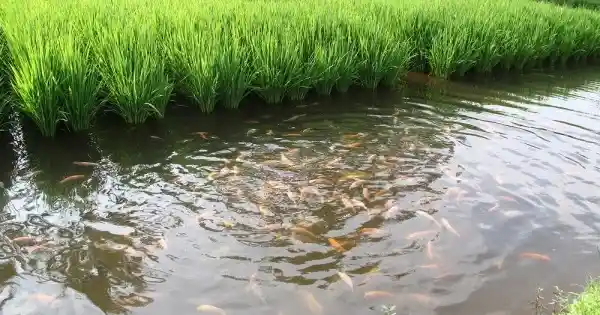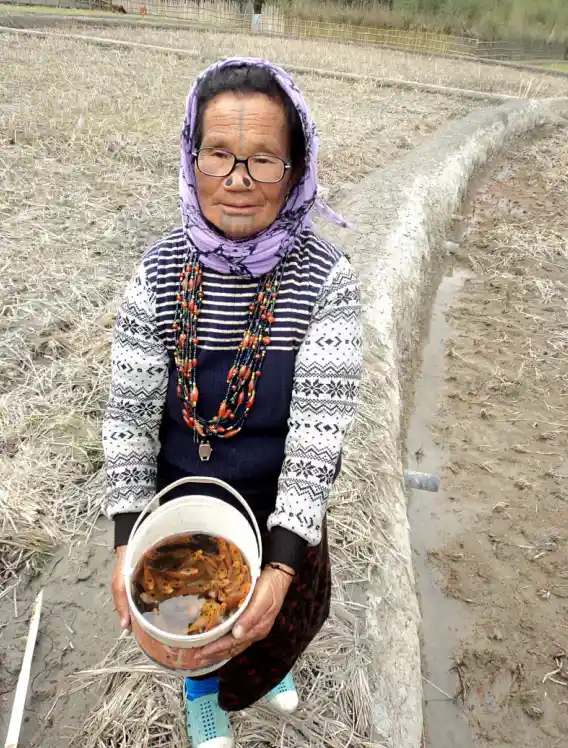Aqua-Green Marvel: Apatani's Mastery in Paddy-Fish Cultivation
Agriculture in India has evolved over centuries by adapting to climate and various socio-economic changes. While, with changing times, many have found shortcuts to make money through agriculture, the Apatani tribe in Arunachal Pradesh not only sticks to their roots but has also developed a symphony of man and the environment.

Paddy-Fish Cultivation | Source: One Earth
The tropical climate and the enriched soil of India have been proven to be the best for agriculture. Agriculture is one of the oldest forms of occupation, with references found in the Rig Veda (sacred Hindu scripture) as well. Traditionally, rice, millet, pulses, and cotton were grown, but as time passed, several cash crops such as opium and indigo were also forcefully grown in the country during the colonial period. Post-independence of India, agricultural practices took a new turn as intensive and high-yielding varieties of crops were encouraged. Not only that but several traditional methods of farming are being encouraged as they are highly sustainable and have proven to be the road to food security and rural development.
Tribal groups in India constitute around 8.6 per cent of the total population. Their traditional methods of agriculture, animal husbandry, and handmade artefacts, have been recognised across the globe. One such tribal group is the Apatani Tribe inhabiting the Ziro Valley of Lower Subansiri District of Arunachal Pradesh in India. Their distinct aquaculture practice is one of the most advanced cultivation practices which they have followed for centuries. The tribe practices the integration of rice and fish farming in the mountain terrains and landscapes. The climate in the region ranges from temperate and humid to subtropical due to which it receives good rainfall even during the summers. Generally, practising agriculture in such a climate is challenging given that there would be constant surface water runoff. But Apatani's farming technique draws a great symphony of man and the environment and proves that man can dwell in any kind of environment if has the skill for it.

Fish stocking by an Apatani Woman | Source: Network of Aquaculture
Here, in Subansiri, the farmers use rice fields to rear fish. This method acts as a great form of organic farming as the fish are natural fertilisers and are also eco-friendly. The fish depend on the natural food sources (algae, insects, and weeds) of the rice fields so the farmers do not have to invest much in the fish feeds. The Apatanis use organic fertilisers such as plant and animal waste. They also use domestic waste which not only is food for the fishes but also enhances crop efficiency. The movement of the fish inside the field also promotes the tillering of the rice. The fish are also a source of income during the off-season and for unemployed individuals.
The fish are reared twice a year, once when the paddy is grown in the field (April-September) and the next when the harvesting of the crops is completed (November-February), before the next season. Apart from aquaculture farming methods, the Apatani use bamboo pipes for irrigation purposes. An outlet system helps in maintaining the consistent water level and dewatering during the harvesting season. These outlets are built in such a way that they do not give any room for the fish to escape. They practice using affordable ecological equipment and are far away from the use of modern tools. Their sustainable practices have created a unique system of productivity and biological balance.
Unfortunately, these tribes are facing tremendous challenges due to constant road construction, over-mining of natural resources in the nearby regions, migration of farmers to urban regions in search of employment, and vulnerability to climate change, among other issues. The Indian Government has extended its administration by enacting policies to protect the tribals of that region. But the bigger question is how many farmers can survive solely on the bare minimum. If the right steps are not taken, these traditional farming methods will soon be lost!


